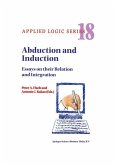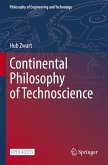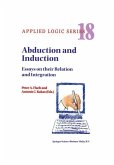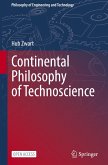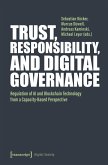Philosophy of Science for Machine Learning
Core Issues and New Perspectives
Herausgegeben:Durán, Juan M.; Pozzi, Giorgia
Philosophy of Science for Machine Learning
Core Issues and New Perspectives
Herausgegeben:Durán, Juan M.; Pozzi, Giorgia
- Gebundenes Buch
- Merkliste
- Auf die Merkliste
- Bewerten Bewerten
- Teilen
- Produkt teilen
- Produkterinnerung
- Produkterinnerung
This open access book offers a comprehensive and systematic debate on the key concepts and areas of application of the philosophy of science for machine learning. The current landscape of the debate about the epistemic and methodological challenges raised by machine learning in scientific fields is fragmented and lacks a common thread that helps to understand the complexity of the issue. Against this background, this book brings together expert researchers in the field, structuring the debate in ways that allow readers to navigate quickly in this evolving field of research and pave the way to…mehr
Andere Kunden interessierten sich auch für
![Abduction and Induction Abduction and Induction]() P.A. Flach / Antonis C. Kakas (Hgg.)Abduction and Induction115,99 €
P.A. Flach / Antonis C. Kakas (Hgg.)Abduction and Induction115,99 €![Künstliche Intelligenz in der Forschung Künstliche Intelligenz in der Forschung]() Carl Friedrich GethmannKünstliche Intelligenz in der Forschung53,49 €
Carl Friedrich GethmannKünstliche Intelligenz in der Forschung53,49 €![Moral AI Moral AI]() Jana Schaich BorgMoral AI8,99 €
Jana Schaich BorgMoral AI8,99 €![Continental Philosophy of Technoscience Continental Philosophy of Technoscience]() Hub ZwartContinental Philosophy of Technoscience31,99 €
Hub ZwartContinental Philosophy of Technoscience31,99 €![Abduction and Induction Abduction and Induction]() Abduction and Induction113,99 €
Abduction and Induction113,99 €![Continental Philosophy of Technoscience Continental Philosophy of Technoscience]() Hub ZwartContinental Philosophy of Technoscience38,99 €
Hub ZwartContinental Philosophy of Technoscience38,99 €![Trust, Responsibility, and Digital Governance Trust, Responsibility, and Digital Governance]() Trust, Responsibility, and Digital Governance30,99 €
Trust, Responsibility, and Digital Governance30,99 €-
-
-
This open access book offers a comprehensive and systematic debate on the key concepts and areas of application of the philosophy of science for machine learning. The current landscape of the debate about the epistemic and methodological challenges raised by machine learning in scientific fields is fragmented and lacks a common thread that helps to understand the complexity of the issue. Against this background, this book brings together expert researchers in the field, structuring the debate in ways that allow readers to navigate quickly in this evolving field of research and pave the way to new paths of philosophical and technical research. Although the book is written from the perspective of philosophy of science and epistemology, it is of interest to philosophers in a myriad of fields, such as philosophy of mind, philosophy of language, philosophy of neuroscience, and metaphysics of science, STS studies, as well as to researchers working on technical and computational issues such as explainability, trustworthiness, interpretability, transparency.
Produktdetails
- Produktdetails
- Synthese Library 527
- Verlag: Delft University of Technology / Springer / Springer Nature Switzerland / Springer, Berlin
- Artikelnr. des Verlages: 89226298, 978-3-032-03082-5
- Seitenzahl: 532
- Erscheinungstermin: 9. Dezember 2025
- Englisch
- Abmessung: 241mm x 160mm x 34mm
- Gewicht: 955g
- ISBN-13: 9783032030825
- ISBN-10: 303203082X
- Artikelnr.: 74917430
- Herstellerkennzeichnung
- Springer-Verlag GmbH
- Tiergartenstr. 17
- 69121 Heidelberg
- ProductSafety@springernature.com
- Synthese Library 527
- Verlag: Delft University of Technology / Springer / Springer Nature Switzerland / Springer, Berlin
- Artikelnr. des Verlages: 89226298, 978-3-032-03082-5
- Seitenzahl: 532
- Erscheinungstermin: 9. Dezember 2025
- Englisch
- Abmessung: 241mm x 160mm x 34mm
- Gewicht: 955g
- ISBN-13: 9783032030825
- ISBN-10: 303203082X
- Artikelnr.: 74917430
- Herstellerkennzeichnung
- Springer-Verlag GmbH
- Tiergartenstr. 17
- 69121 Heidelberg
- ProductSafety@springernature.com
Juan M. Durán is an Assistant Professor at the Delft University of Technology. His work has focused on the intersection between philosophy of science and technology, first with computer simulations and more recently with machine learning. He also has extensive work on the ethics of technology. In 2019 he was awarded the Herbert A. Simon Award for outstanding research in computing and philosophy. This award is offered by the International Association for Computing and Philosophy (IACAP) and recognizes scholars at an early stage of their academic career who are likely to reshape debates at the nexus of computing and philosophy with their original research. He has held visiting fellowships at the University of Virginia, Tilburg University, and the Netherlands Institute for Advanced Studies in the Humanities and Social Sciences. His current work focuses on developing Computational Reliabilism, a theoretical framework for the justification of our belief in the output of machine learning. Giorgia Pozzi is a Ph.D. Candidate at TU Delft working at the intersection between the ethics and epistemology of explanatory AI, with a particular interest in machine-learning implementations in the field of medicine and healthcare. Among others, her research focuses on injustices that can emerge in connection to ML in healthcare, particularly due to the epistemic limitations of ML systems. Furthermore, she is interested in questions regarding the bearing of epistemic justification on moral justification in AI-based medical decision-making. She is thus interested in making explicit and investigating in-depth the conflating and intertwined nature of epistemology and ethics in the context of AI. Before joining TU Delft, she obtained a Bachelor's degree in Philosophy (focusing on moral philosophy and metaethics) and in Chinese Studies at Ludwig-Maximilians-University (LMU) in Munich. Afterwards, she completed her Master’s focusing on the ethics and epistemology of artificial intelligence at the same university.
Part I: Epistemic opacity.- 1 In Which Ways is Machine Learning Opaque? (Claus Beisbart).- 2 How I Stopped Worrying and Learned to Love Opacity (Nico Formanek).- 3 Epistemic opacity and scientific realism and anti-realism (Jack Casey).- Part II: Justification.- 4 Beyond transparency: computational reliabilism as an externalist epistemology for algorithms (Juan M. Durán).- 5 Challenges for Computational Reliabilism: Epistemic Warrants, Endogeneity and Error-Based Opacity in Machine Learning (Ramón Alvarado).- 6 Can XAI Justify? (Carlos Zednik, Philippe Verreault-Julien).- Part III: Scientific Explanation (XAI) .- 7 Axe the X in XAI: A Plea for Understandable AI (Andrés Páez).- 8 Machine Learning models as Mathematics (Stefan Buijsman).- 9 From Explanations to Interpretability and Back (Tim Räz).- Part IV: Scientific Understanding and Interpretability.- 10 Explanation hacking: The Perils of Algorithmic Recourse (Emily Sullivan, Atoosa Kasirzadeh).- 11 Stakes and Understanding the Decisions of Artificial Intelligent Systems (Eva Schmidt).- Part V: Scientific Models and Representation.- 12 Representation Learning Without Representationalism. A Non-Representationalist Account of Deep Learning Models in Scientific Practice (Phillip Hintikka Kieval).- 13 Artificial Neural Nets and the Representation of Human Concepts (Timo Freisleben).- 14 Defining Formal Validity Criteria for Machine Learning Models (Chiara Manganini, Giuseppe Primiero).- Part VI: Scientific practice and scientific values in ML.- 15 Why are Human Epistemic Agents not Displaced in Machine Learning Scientific Inquiries? (Sahra A. Styger, Marianne de Heer Kloots, Oskar van der Wal, and Federica Russo).- 16 Values, Inductive Risk, and Societal-Epistemic Coupledness in Machine Learning Models (Milou Jansen, Koray Karaca).- 17 Machine Learning and the Ethics of Induction (Emanuele Ratti).- Part VII: ML in the Particular Sciences.- 18 Beyond Classification and Prediction: The Promise of Physics-Informed Machine Learning in Astronomy and Cosmology (Helen Meskhidze).- 19 Machine Learning Discoveries and Scientific Understanding in Particle Physics: Problems and Prospects (Florian J. Boge and Henk W. de Regt).- 20 Don t Fear the Bogeyman: On Why There is no Prediction-Understanding Trade-Off for Deep-Learning in Neuroscience (Barnaby Crook, Lena Kästner).- 21 Artificial Intelligence in Climate Science: From Machine Learning to Neural Networks (Greg Lusk).- 22 Machine Learning in Public Health and the Prediction-Intervention Gap (Thomas Grote, Oliver Buchholz).
Part I: Epistemic opacity.- 1 In Which Ways is Machine Learning Opaque? (Claus Beisbart).- 2 How I Stopped Worrying and Learned to Love Opacity (Nico Formanek).- 3 Epistemic opacity and scientific realism and anti-realism (Jack Casey).- Part II: Justification.- 4 Beyond transparency: computational reliabilism as an externalist epistemology for algorithms (Juan M. Durán).- 5 Challenges for Computational Reliabilism: Epistemic Warrants, Endogeneity and Error-Based Opacity in Machine Learning (Ramón Alvarado).- 6 Can XAI Justify? (Carlos Zednik, Philippe Verreault-Julien).- Part III: Scientific Explanation (XAI) .- 7 Axe the X in XAI: A Plea for Understandable AI (Andrés Páez).- 8 Machine Learning models as Mathematics (Stefan Buijsman).- 9 From Explanations to Interpretability and Back (Tim Räz).- Part IV: Scientific Understanding and Interpretability.- 10 Explanation hacking: The Perils of Algorithmic Recourse (Emily Sullivan, Atoosa Kasirzadeh).- 11 Stakes and Understanding the Decisions of Artificial Intelligent Systems (Eva Schmidt).- Part V: Scientific Models and Representation.- 12 Representation Learning Without Representationalism. A Non-Representationalist Account of Deep Learning Models in Scientific Practice (Phillip Hintikka Kieval).- 13 Artificial Neural Nets and the Representation of Human Concepts (Timo Freisleben).- 14 Defining Formal Validity Criteria for Machine Learning Models (Chiara Manganini, Giuseppe Primiero).- Part VI: Scientific practice and scientific values in ML.- 15 Why are Human Epistemic Agents not Displaced in Machine Learning Scientific Inquiries? (Sahra A. Styger, Marianne de Heer Kloots, Oskar van der Wal, and Federica Russo).- 16 Values, Inductive Risk, and Societal-Epistemic Coupledness in Machine Learning Models (Milou Jansen, Koray Karaca).- 17 Machine Learning and the Ethics of Induction (Emanuele Ratti).- Part VII: ML in the Particular Sciences.- 18 Beyond Classification and Prediction: The Promise of Physics-Informed Machine Learning in Astronomy and Cosmology (Helen Meskhidze).- 19 Machine Learning Discoveries and Scientific Understanding in Particle Physics: Problems and Prospects (Florian J. Boge and Henk W. de Regt).- 20 Don t Fear the Bogeyman: On Why There is no Prediction-Understanding Trade-Off for Deep-Learning in Neuroscience (Barnaby Crook, Lena Kästner).- 21 Artificial Intelligence in Climate Science: From Machine Learning to Neural Networks (Greg Lusk).- 22 Machine Learning in Public Health and the Prediction-Intervention Gap (Thomas Grote, Oliver Buchholz).


